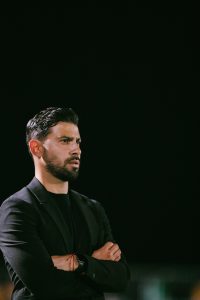- Slug: Sports-Phoenix Rising Academy, 592 words.
- Photo available
By Ciaran Doyle
Cronkite News
PHOENIX – The Phoenix Rising are a team in transition.
The first part of that transition started in August, when the Rising replaced former coach Rick Schantz with Juan Guerra. The next part of that transition is ongoing and involves finding diamonds in the rough through their academy.
The academy is made up of Rising youth players – a talented group of 7- to 19-year-olds – who play against opposing USL academies year-round. The older age groups have the opportunity to play in MLS NEXT, a development experience that provides additional game experience against MLS academies. Each academy aims to develop players at a young age in effort to continue to the first team by the time they are eligible.
Phoenix signed the franchise’s first-ever academy player to the first team in 2021, when Niall Dunn joined the club and later made his professional debut for the team two days before his 17th birthday. Today, he remains on the roster as he tries to crack the starting lineup.
Andy Chapman, the professional academy head coach for the Rising, says the aim is to play against the best possible competition and “provide the best possible environment for the players.”
The Rising has a reputable academy for a USL club, but compared to MLS clubs, there’s a dip in competition based on one key factor: money.
“The difference is the budget (ML teams) can run an academy at so that players aren’t paying for training or the travel involved,” Chapman said. “There is a clear difference in that they do attract the most athletic, gifted and physical players in their region. Them being an MLS club will attract players first and foremost because they can see a clear pathway.”
The Rising’s academy opened in 2012, but besides Dunn, few Rising players have been promoted to the first team. The reason is not due to a lack of talent, according to team play-by-play announcer Ryan Sýkora.
The academy has been underutilized under previous regimes.
“I think a lot of how academy talent is used is based on what the coach and GM want to do,” Sýkora said. “(Rising general manager) Bobby Dulle and Rick Schantz didn’t like to use the academy that much because Phoenix had the money to go out there and buy other players.”
Now with Guerra at the helm, the question begs: Will the Rising change their approach to how they use academy players?
Guerra wants to provide more opportunities to the young players, which is something that can help push the team forward in future years. But as every existing professional sports franchise experiences, there’s a delicate balance between trying to win now and planning for a successful future.
“The academy will be very important for us,” Guerra said. “Once they are called up to first-team training, I view them as any other player. From there, I don’t look at size or age, just talent and abilities. If those guys come in and can give us the same thing the pro guys are giving us, they’re going to get an opportunity.”
Phoenix has routinely operated as a win-now franchise, leaving Sýkora unconvinced about the team taking full advantage of the current crop of academy players.
“I don’t know if the academy right now is absurdly helpful for the first team, just because they’re a Rising team that very much is focused on consistently winning now so they don’t often go to the academy guys as often as they should,” he said. “It will be interesting to see what Juan Guerra’s take on that is.”
For more stories from Cronkite News, visit cronkitenews.azpbs.org.
